Elections without choice: A leaf out of autocrats’ playbook

In 1978, a book edited by Guy Hermet, Richard Rose and Alain Rouquie was published with an interesting title, Elections without Choice. The book drew some attention soon after its publication, but little did we know that, decades later, the notion of "elections without choice" would become so relevant to the world in general but more so for Bangladesh. As the country is heading towards an exercise that the incumbent is calling an election, it is imperative that we understand what is in the making.
The edited volume of Elections without Choice was an outcome of a research project initiated by the Committee on Political Sociology, composed of the International Political Science Association and the International Sociological Association. The editors quite rightly noted that political scientists deliberately avoid discussing non-competitive elections, because those elections do not meet the fundamental criterion of a liberal democracy. Not only did they underscore the need for understanding non-competitive elections, but also insisted that such elections are important in tracing the trajectory of each country.
The book was published at a time when the world was witnessing a gradual shift towards democracy, one country at a time. The Carnation Revolution in 1974 in Portugal and the death of Francisco Franco in 1975 in Spain started a wave, identified as the "Third Wave of Democracy" by Samuel Huntington in 1991. In the early days of democratisation, promoted by Western countries, it was assumed that an election was a key indicator of the political liberalisation process.
In the 1990s, with the demise of the Soviet Union and the fall of the Berlin Wall, democracy proliferated globally. It was believed that democratic regimes would be the norm and there could be only a few holdouts of autocratic regimes. But within less than a decade, two features became evident. The first one was that elections by themselves do not demonstrate democratisation, because authoritarian regimes also hold elections that are manipulated. The second feature was the emergence of a new kind of regime, with some apparent democratic traits but which are essentially autocratic; they were called hybrid regimes.
The 2014 election was boycotted by the opposition, yet strategies such as packing the Election Commission, or harassing the opposition, or changing electoral rules were used by the incumbent. In the 2018 election, another tool was added—keeping opposition candidates off the ballot—and this was done both by confining leaders and cancelling their nominations on flimsy grounds, making the candidates spend time at the courthouse, which has not been helpful to the candidates.
Subsequently, these regimes, which often hold elections and win at ease, were described as "electoral authoritarianism." These regimes tend to hold regular elections, but these elections are engineered in a fashion that opposition parties have little to no chance to win. In both closed autocracy and hybrid regimes, these exercises are essentially "elections without choice." Consequently, the attention of political scientists and observers shifted to the "quality" of elections.
Evidence mounted in the 2000s that autocrats and rulers of the hybrid regimes manipulate elections. Election manipulation was not a new phenomenon. However, from the 1970s through the 1990s, manipulation of elections was easily detectable: there was blatant rigging, which included capturing polling booths on election day and weapon-wielding party loyalists scaring voters away from polling stations and stuffing the ballot boxes.
But as these hybrid regimes emerged and the despots needed to have some semblance of legitimacy to continue their rule, rigging of an election took a different route. This is the period of regression of democracy, often described as "democratic backsliding," which political scientist Nancy Bermeo defined as "the state-led debilitation or elimination of any of the political institutions that sustain an existing democracy." These political institutions, Bermeo reminded us in an essay, include "all the institutions that enable people to formulate and signify preferences and then have them weighed by their elected representatives."

Two years after Bermeo's essay was published, a seminal book by Steven Levitsky and Daniel Ziblatt published in 2018, titled How Democracies Die, unequivocally stated that sometimes democracy dies with a bang, with coups, quickly and forcefully. But lately it happens slowly, incrementally; "democratic backsliding today begins at the ballot box." The would-be autocrats rise through the elections, and then they change the rules of the game. Levitsky and Ziblatt use the analogy of a football game. "To consolidate power, the would-be authoritarians must capture the referees, sideline at least some of the other side's star players, and rewrite the rules of the game to lock in their advantage, in effect tilting the playing field against their opponent." When they talk of a referee, in the political context, who are they referring to? "These include the judicial system, law enforcement bodies, and intelligence, tax and regulatory agencies," they write.
Election, in a tilted field, is already rigged in such a manner that it can deliver only one result—a victory for the incumbent. The manipulation of elections, Bermeo told us, is one of the three key features of democratic backsliding. But such manipulation is not like how the classical autocrats used to do it—blatantly. Instead, these are "strategic manipulation," which includes "a range of actions aimed at tilting the electoral playing field in favor of incumbents." Bermeo provides a list of these actions: "keeping opposition candidates off the ballot," "packing electoral commissions," "changing electoral rules to favor incumbents," and "harassing opponents." Usually, these are done "in such a way that the elections themselves do not appear fraudulent" and are intended to fool election observers and the international community.
As for these practices, perhaps nobody else has identified them better than Nic Cheeseman and Brian Klaas. Their book, published in 2018, is titled How to Rig an Election. The name sounds like a manual. In some measures, it is so. Only that they have dissected the manual or the playbook of the autocrats drawing on elections around the world. Cheeseman and Klaas identified the leaders who go for rigging: "Leaders are most likely to try and stay in power when they believe that their presence is essential to maintain political stability; in cases when they are less committed to plural politics; when they have engaged in high-level corruption and/or human rights abuses; when they lack trust in rival leaders and political institutions; when they have been in power for a longer period of time; and when they control geostrategically important states with natural resources, effective security forces, weak institutions and high levels of distrust."
They looked at six strategies that autocrats use to manipulate elections: gerrymandering (shaping electoral constituencies to the incumbent's benefit), vote buying, repression of opposition, hacking the election, stuffing the ballot box, and playing the international community. Interestingly, while ballot box stuffing is the most effective strategy, considering the risk of exposure, often autocrats use other strategies ahead of the election to ensure a victory. This is how elections are held by autocratic regimes.
Since the 2014 election, none of these strategies have been in short supply in Bangladesh. That election was boycotted by the opposition, yet strategies such as packing the Election Commission, or harassing the opposition, or changing electoral rules were used by the incumbent. In the 2018 election, another tool was added—keeping opposition candidates off the ballot—and this was done both by confining leaders and cancelling their nominations on flimsy grounds, making the candidates spend time at the courthouse, which has not been helpful to the candidates.
These have delivered victory, not only a hollow one but something more than that, if we borrow from Cheeseman and Klass: "so one sided as to beggar belief, exposing the ruling party to ridicule." The ruling Awami League has not, by any means, abandoned its 2014 and 2018 strategies, but instead has become further audacious. The violent crackdown on opposition since October 28, arrests of BNP leaders, convictions of BNP leaders and activists at lightning speed, and shutting down party offices are testimonies to the continuation of these strategies. They also show how referees have been captured.
But in search of a way to avoid the ridiculous situations of winning 153 seats unopposed in 2014 or winning 96 percent of seats with allies in 2018, and additionally to "play the international community," it has invented a new way called fielding "dummy candidates." The so-called 'dummies" are candidates who belong to the ruling party but are contesting the election as "independents" with the approval of the party. Besides, the smaller parties, "king's parties," and individuals who have been cajoled or coerced into participating in the election, thanks to state apparatuses, would like to run under the symbol of the ruling AL.
Ironically, these have not saved the party from being a subject of ridicule, but made it more embarrassing for it long before a single vote has been cast. Importantly, all these have laid bare that the ruling AL is moving towards an "election without choice."
Ali Riaz is distinguished professor of political science at Illinois State University in the US, non-resident senior fellow of the Atlantic Council, and president of the American Institute of Bangladesh Studies (AIBS). His forthcoming book is titled 'Pathways of Autocratization: The tumultuous journey of Bangladeshi politics.'
Views expressed in this comment are the author's own.
Follow The Daily Star Opinion on Facebook for the latest opinions, commentaries and analyses by experts and professionals. To contribute your article or letter to The Daily Star Opinion, see our guidelines for submission.

 For all latest news, follow The Daily Star's Google News channel.
For all latest news, follow The Daily Star's Google News channel. 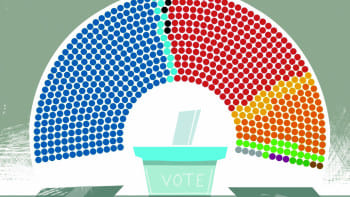
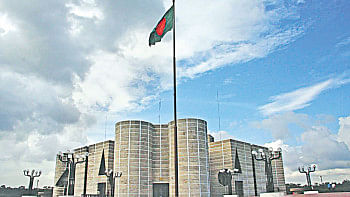
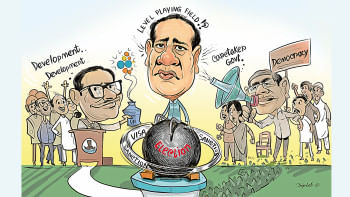


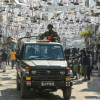
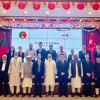
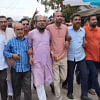




Comments